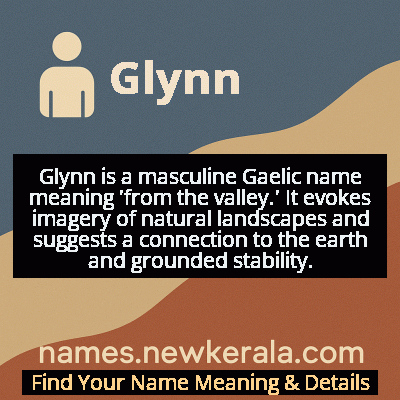Glynn Name Meaning & Details
Origin, Popularity, Numerology Analysis & Name Meaning of Glynn
Discover the origin, meaning, and cultural significance of the name GLYNN. Delve into its historical roots and explore the lasting impact it has had on communities and traditions.
Name
Glynn
Gender
Male
Origin
Gaelic
Lucky Number
9
Meaning of the Name - Glynn
Glynn is a masculine Gaelic name meaning 'from the valley.' It evokes imagery of natural landscapes and suggests a connection to the earth and grounded stability.
Glynn - Complete Numerology Analysis
Your Numerology Number
Based on Pythagorean Numerology System
Ruling Planet
Mars
Positive Nature
Generous, passionate, energetic, and humanitarian.
Negative Traits
Impulsive, impatient, moody, and can be overly emotional.
Lucky Colours
Red, maroon, scarlet.
Lucky Days
Tuesday.
Lucky Stones
Red coral, garnet.
Harmony Numbers
1, 2, 3, 6.
Best Suited Professions
Military, sports, philanthropy, leadership roles.
What People Like About You
Courage, energy, leadership, generosity.
Famous People Named Glynn
Glynn Turman
Actor
Award-winning actor known for roles in 'The Wire' and 'House of Lies'
Glynn S. Lunney
NASA Engineer
NASA flight director during Apollo and Space Shuttle programs
Glynn Wolfe
Record Holder
Guinness World Record holder for most marriages
Glynn Washington
Radio Host
Host and creator of NPR's Snap Judgment
Name Variations & International Equivalents
Click on blue names to explore their detailed meanings. Gray names with will be available soon.
Cultural & Historical Significance
The name Glynn also represents the intersection of different Celtic cultures, appearing in both Irish and Welsh contexts with slightly different spellings but shared meanings. This cross-cultural presence makes it a bridge between different Celtic traditions. In modern times, the name maintains its connection to heritage while adapting to contemporary naming practices, serving as a reminder of the enduring influence of Celtic language and culture on English-speaking societies. The geographical significance of valleys in Celtic mythology—often seen as places of mystery, protection, and spiritual significance—adds deeper layers to the name's cultural resonance.
Extended Personality Analysis
Individuals named Glynn are often perceived as grounded, stable, and deeply connected to their roots, much like the valleys from which their name derives. They tend to be practical problem-solvers with a calm demeanor, able to navigate life's challenges with steady determination. Their valley-inspired nature suggests someone who provides shelter and stability to others, often serving as a reliable anchor in relationships and professional settings. Glynn's typically exhibit a quiet strength rather than flashy confidence, preferring substance over showmanship.
These individuals often possess an intuitive understanding of natural rhythms and cycles, making them excellent at long-term planning and seeing the bigger picture in complex situations. They're frequently described as patient listeners who absorb information before speaking, and their advice tends to be well-considered and practical. While they may not seek the spotlight, Glynn's often become respected leaders through their consistent reliability and depth of character. Their connection to the valley symbolism also suggests a capacity for nurturing growth in others, creating environments where people feel safe to develop and flourish. This combination of stability and nurturing makes them valued friends, partners, and colleagues.
Modern Usage & Popularity
In contemporary times, Glynn maintains a steady though modest presence, particularly in regions with strong Celtic heritage like Ireland, Scotland, Wales, and communities with Celtic diaspora connections. While not among the most popular names, it enjoys consistent usage among families seeking traditional Celtic names with natural meanings. The name has seen a slight resurgence in recent years as part of the broader trend toward nature-inspired and heritage names. It's particularly favored by parents looking for a strong, masculine name that isn't overly common, offering a distinctive alternative to more popular nature names like River or Forest while maintaining similar earthy connotations. In the United States, Glynn typically ranks outside the top 1000 names but maintains regional popularity in areas with strong Irish or Welsh communities.
Symbolic & Spiritual Meanings
Symbolically, Glynn represents shelter, fertility, and the meeting of earth and water—much like actual valleys that cradle rivers and support abundant life. The name evokes images of protected spaces where growth can flourish safely, suggesting someone who creates environments where others can thrive. Metaphorically, it speaks to depth rather than height, inner strength rather than outward display, and the quiet power of containment rather than the obvious force of expansion. The valley symbolism also suggests a path through obstacles, representing someone who can find ways through difficult circumstances and help guide others through challenging times. In spiritual terms, valleys are often seen as places of reflection and transformation, indicating that those named Glynn may possess deep introspective qualities and the ability to facilitate personal growth in themselves and others.

